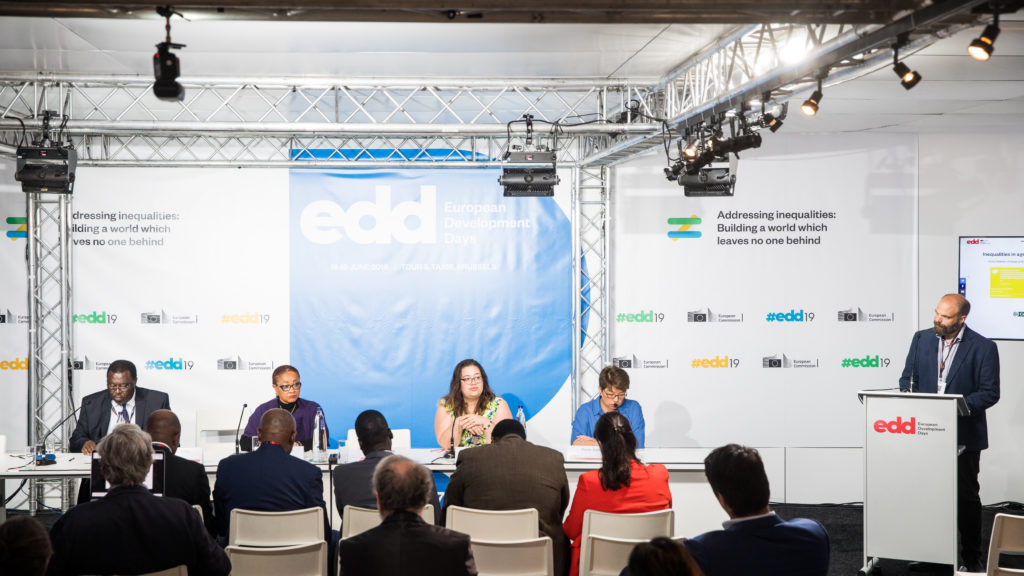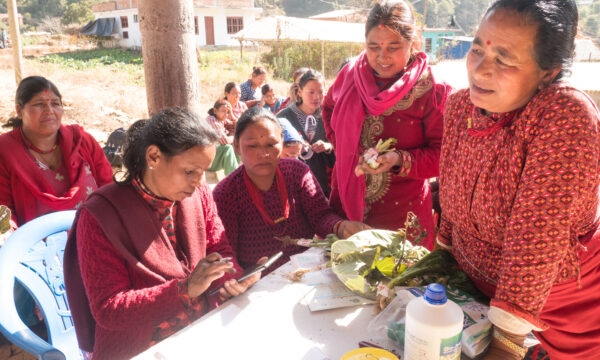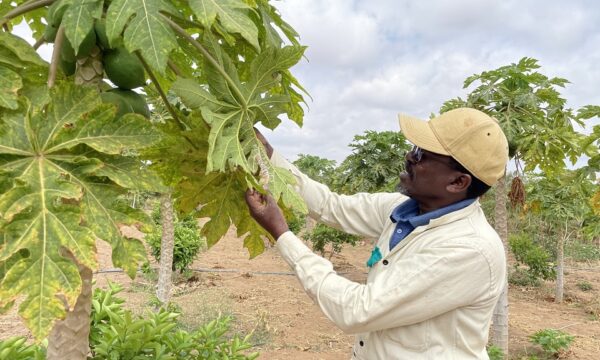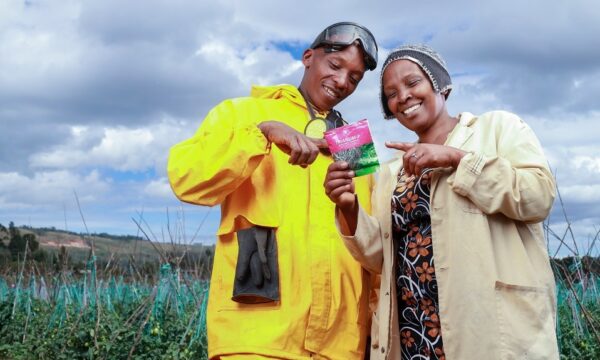
The 2019 European Development Days (EDD), held 18-19 June in Brussels focused on ‘addressing inequalities: building a world which leaves no one behind’. CABI convened a panel at this year’s edition on inequalities in agriculture and how these are a threat to sustainable development, preventing farmers from reaching their potential.
EDD is an annual event which brings together the development community to share ideas and experiences in ways that inspire new partnerships and innovative solutions to the world’s most pressing challenges. CABI’s panellists brought a wealth of experience, discussing how cross-sectoral collaborations in agriculture are the only way to build a world which leaves no one behind.
The panel included Dr Dennis Rangi, CABI’s Director General of Development; Madame Ambassador Josefa Sacko, Commissioner for Rural Economy and Agriculture at the African Union; Dr Sarah Cardey, Associate Professor from the University of Reading; and Pacita Juan, founder of ECHOstore. The session was moderated by Ben Deighton, Managing Editor of SciDev.Net.
- Dr Dennis Rangi
- H.E. Josefa Sacko
- Dr Sarah Cardey
- Pacita Juan
The world’s 500 million smallholder farmers face a variety of environmental, economic and educational inequalities. Inequalities are wicked problems; difficult to solve and often contradictory. There is not one solution, and the solutions will be messy and will take a long time. However, we can unpick those complexities. While the changing nature of those inequalities makes them difficult to address, one way is to disentangle the communities and talk about different groups within communities and their different needs.
Young people, for example, are not necessarily recognized as full members of the economy or as agricultural producers in their own right. This can drive them away from the land leaving older farmers to work well into their eighties. To address this issue, older farmers should be allowed to retire. To keep young people on the land, we need to recognize and encourage them, and create an atmosphere where agriculture is seen as interesting and a rewarding career option. This can be done through using new technologies or simply by asking young people what they want and actively listening to them.
Beyond youth we need to acknowledge that people in general have a more interrogative understanding of their own lives than we tend to credit them with. Here again the key is listening to them and encouraging them by developing an enabling environment. Smallholder farmers are fundamentally innovative. They know what they are doing and their innovative processes need to be supported, especially those relating to marginalized groups because not all farmers are equal.
The lack of information and training among farmers also needs to be tackled. For example, farmers in the developing world tend to know very little about fertilizers, weed killers and pesticides, and they often fall prey to those who promote only chemical products.
Even small information initiatives encouraging farmers to switch to organic farming or grow niche products can have far-reaching benefits. Consumer awareness can also play a part in this. Since we are all co-producers, it is what we eat every day that will determine what the farmers plant.
Women in agriculture, like men, face the challenges of a lack of access to education and information. Women often also lack access to finance. Despite this, opportunities abound. For example, women are becoming more involved in coffee production and are doing so successfully. Thanks to various initiatives, women are taught how to make better coffee and how to access specialty markets.
Climate change is one area where not enough is being done and where information is crucial. We need to teach smallholder farmers resilience in the face of climate change and we need to communicate the urgency of addressing the threat of climate change at all levels. Small farmers in Africa, for example, must learn the importance of not chopping down their forests. They must also be taught the importance of changing some of their farming practices to reflect climate change.
Developing countries may not be major contributors to climate change and pollution, but this does not mean they can rest on their laurels. They also need to protect their own environment. Agriculture should be a source of both pride and income.
Listen to the session in full:
Summary provided by the EDD19 team. Visit the session page on the EDD website→
1 Comment
Leave a Reply
Related News & Blogs
PlantwisePlus restarts plant clinics following conflict in Tigray region of Ethiopia
Market in the Tigray region of Ethiopia In the Tigray region of Ethiopia, village-based plant clinics have traditionally flourished. Running from 2014 to 2020, with the support of CABI and Ethiopia’s Ministry of Agriculture (MoA), the local government…
22 January 2024









[…] Agriculture, Crop losses, Pest management, Plant health, Plant pests and diseasescrop pests and diseases, China, research Previous Article Agriculture should be a source of pride and a good economy […]